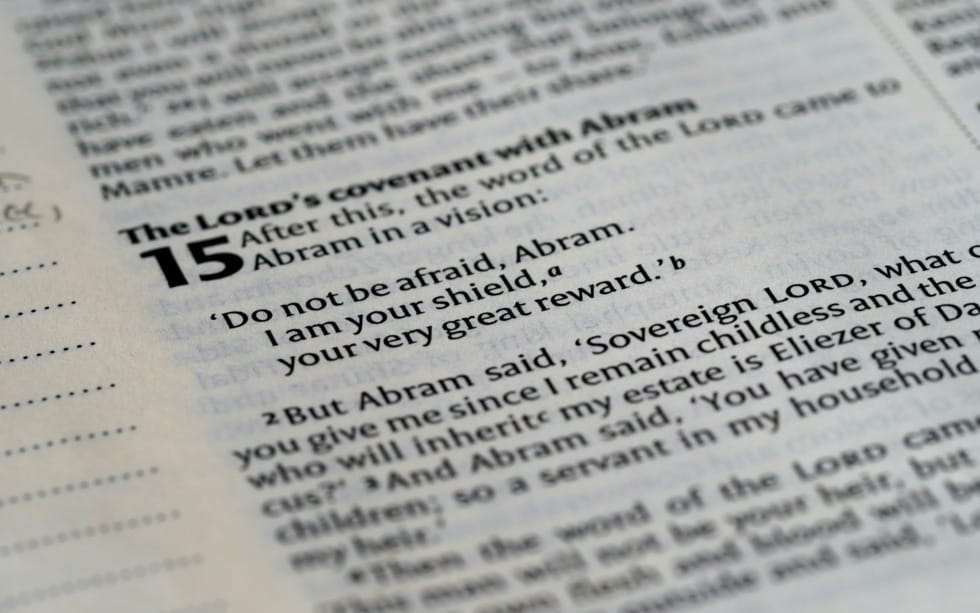What Does God’s Covenant with Abram Mean for Us? (Genesis 14-20)
How does this covenant between God and Abram still apply to us today? God reveals through Genesis why this covenant helps to build our trust in His plan.

Genesis 14-20
Today's Scripture Passage
A Few Thoughts to Consider
Why is God’s covenant with Abram significant for us today?
While Genesis 12 details God’s promise to Abram, Genesis 15 outlines God’s covenant with him. When it comes to covenants, God establishes two forms with his people—conditional and unconditional. “The ceremony recorded in Genesis 15 indicates the unconditional nature of the covenant.”[1] This is because “when a covenant was dependent upon both parties keeping commitments, then both parties would pass between the pieces of animals. In Genesis 15, God alone moves between the halves of the animals.”[2]
In Genesis 17:3-8, we see these words:
3 Then Abram fell facedown and God spoke with him: 4 “As for me, here is my covenant with you: You will become the father of many nations. 5 Your name will no longer be Abram; your name will be Abraham, for I will make you the father of many nations. 6 I will make you extremely fruitful and will make nations and kings come from you. 7 I will confirm my covenant that is between me and you and your future offspring throughout their generations. It is a permanent covenant to be your God and the God of your offspring after you. 8 And to you and your future offspring I will give the land where you are residing—all the land of Canaan—as a permanent possession, and I will be their God.”
Here, we see God reiterate his promise to Abram, a name change from Abram to Abraham, and the commitment to confirming this covenant in future generations. In return, as a sign of their commitment to this covenant, Abraham and his male descendants will be circumcised. While the concept of a sign of circumcision might sound bizarre in our “civilized society” today, keep in mind this fundamental truth that God goes to where people are and uses illustrations and metaphors that he knows will resonate.
It wasn’t as though the act of circumcision was some magical means of earning God’s approval. “Indeed,” Willem VanGemeren writes, “the New Testament speaks of the futility of physical circumcision if it is not accompanied by internal, spiritual circumcision.”[3] Paul said in Romans 2:29, “circumcision is of the heart—by the Spirit, not the letter.”
This is something important to keep in mind. Whenever God gives what we might consider a primitive, bizarre command in the Old Testament, his motivation is always to go where humanity is and deal with the human heart.
A Meditation to PRAY
Praise | Lord, thank you for being a covenantal God.
Release | I release my desire to do things my way and commit to being bound to you.
Ask |Deal with my heart today and show me areas I need to change to draw closer to you.
Yield | Thank you for taking the penalty for my sin. I give you control of my life.
A Challenge to Act Like Christ
No amount of law-keeping can ever save us. True salvation is only made possible through Christ’s death and resurrection. “Paul testified that his own circumcision on the eighth day was worthless in comparison to his being in Christ (Phil. 3:4–7). Every believer is circumcised spiritually in Christ through the renewal that comes from Christ’s resurrection (Col. 2:11–13).”[1]
That is God’s part. Our part as humans is to increase in faith. Gordon Wenham notes the verbal form of “Abram believed” in Genesis 15:6 “probably indicates repeated or continuing action. Faith was Abram’s normal response to the Lord’s words.”[2] This is the mark of someone who truly trusts God.
True faith is a daily choice. And as Daniel Henderson often says, “The hardest part of the Christian life is that it is so daily.” It’s choosing to actively trust God’s covenantal promises even when we can’t see how they will be fulfilled.
*Unless you specify otherwise, comments and questions you ask may be featured in upcoming podcast episodes.
[1] https://www.gotquestions.org/Abrahamic-covenant.html
[2] https://www.gotquestions.org/Abrahamic-covenant.html
[3] Bryan Chapell, eds. Gospel Transformation Study Bible Notes. Accordance electronic ed. (Wheaton: Crossway, 2013), paragraph 448.
[4]Bryan Chapell, eds. Gospel Transformation Study Bible Notes. Accordance electronic ed. (Wheaton: Crossway, 2013), paragraph 448.
[5] Gordon J. Wenham, Genesis 1–15, vol. 1, Word Biblical Commentary (Dallas: Word, Incorporated, 1987), 329.





